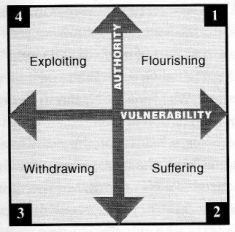Even when we have become adults and know how to be safe from most preventable catastrophes, we tend to be averse to risks of all kinds. Insurance policies, cellular phones and home security systems further minimize risks for those who can pay for such services.
About a decade ago, a pastor introduced me to seeing risk in a completely different and much more positive light. From other reading I have done since then I have begun to see a close relationship between risk and living faithfully in this world. Here is some of that journey:
1) In my tradition a pastor who is being considered for hire at a church comes to preach a Sunday sermon prior to the members of the congregation voting "yes" or "no." What is typical is that this pastor will choose one of his well rehearsed sermons, one about which he or she has received encouraging feedback and presents this one to the prospective parishioners. However, Pastor D did not do this. He would have used a familiar sermon, but he felt compelled to write a custom-made message based on the parable of the talents. Not only did he preach a sermon about risk, but he put that into practice in the very act of preaching it. In this parable, the character who plays it safe and buries his talent (then a sum of money) in the ground is strongly condemned. Those who take the talents entrusted to them and develop them are praised. The application for us was that avoiding risk is not the way Jesus wants us to order our lives. Making the most of opportunities He gives us will entail ventures that may not always feel "safe."
2) Author and speaker Andy Crouch has taken the two concepts of authority and vulnerability and placed them in a chart to create four quadrants. Low vulnerability and low authority is labelled as "withdrawing", but it could also be called safety. An example of this can happen in the type of retirement where a person goes from cruise to excursion but does very little in the way of meaningful action. Another form of safety comes when a person has a great deal of authority over others and because of wealth experiences very little vulnerability. This person feels that he or she is invincible, and the result is exploitation towards those lower in status. The ideal place to be, according to Crouch is where both authority (meaningful action) and vulnerability are both high. To be fully human we need to acknowledge and not fight against the limits placed upon us as human beings. Something my family did in 2015 would seem risky to many people. We opened our home to a person we knew almost nothing about: a young woman fleeing a war-torn nation as a refugee. And yet, from oldest to youngest we all agree that the eight months she lived with us made us individually and as a family more compassionate, flexible and patient, more into the people God wants us to be. This risk led to flourishing for not only ourselves but for the person we embraced, and the ongoing relationship will continue to shape us.
 |
| https://paulwilkinson.files.wordpress.com/2016/02/andy-crouch-strong-and-weak.jpg?w=235&h=232 |
Pursuing further education is another risk at my doorstep, but seeing it as an opportunity for growth changes my perspective and lends me courage.


